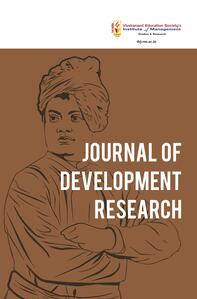
1 C. U. Shah University, Surendranagar, Gujarat, India
Creative Commons Non Commercial CC BY-NC: This article is distributed under the terms of the Creative Commons Attribution-NonCommercial 4.0 License (http://www. creativecommons.org/licenses/by-nc/4.0/) which permits non-Commercial use, reproduction and distribution of the work without further permission provided the original work is attributed.
The promotion of employee well-being and performance is one of the key goals of organisations after COVID-19. Nonetheless, the current economic crisis tyrannises this goal, cruelly jeopardising the sustainability of prior decades’ well- being and performance. It is acknowledged that stress is unavoidable and if not managed properly, can have a negative impact on teachers’ health and well-being. In the current research, responses were collected from 512 university teachers to understand the challenges they are facing and the results were analysed with the help of ‘principal component analysis’. Results revealed that major factors contributing to the feelings of being stressed are sense of insecurity due to poor skills, unable to meet deadlines, lack of clarity, violating formal procedures, uninteresting work, poor quality due to heavy workload, fear of losing job, and lack of training and preparation. The symptoms and dangers of stress can be reduced by raising awareness, taking remedial action and engaging in appropriate stress-reduction activities.
Mental health and well-being, organisational sustainability, occupational stress, university teachers
Agha, K., Azmi, F. T., & Irfan, A. (2017). Work–Life Balance and Job Satisfaction: An Empirical study Focusing on Higher Education Teachers in Oman. International Journal of Social Science and Humanity, 7(3), 164.
Ahmdy, S., Changiz, T., Masiello, I., & Brommels, M. (2007). Organizational role stress among medical school faculty in Iran: Dealing with role conflict. BMC Medical Education, 7(1), 1–10.
Banerjee, S., & Mehta, P. (2016). Determining the antecedents of job stress and their impact on job performance: A study among faculty members. IUP Journal of Organizational Behavior, 15(2), 7.
Desrani, H. (2013). Occupational stress and management policies. Journal of Research in Humanities and Social Sciences, 1(6), 15–22.
Doss, C. A. V., Rachel, J. J., AbuMadini, M. S., & Sakthivel, M. (2018). A 258 com- parative study to determine the occupational stress level and professional burnout in special school teachers working in private and government schools. Global Journal of Health Science, 10(3), 42.
Hasan, N. A. B. B., & Teng, L. S. (2017). Work-life balance and job satisfaction among working adults in Malaysia: The role of gender and race as moderators. Journal of Economics, Business and Management, 5(1), 18–24.
Kalpana, S., & DhineshBabu, S. (2015). A study on work–life balance among women mar- ried college teachers in Trichy district. Shanlax International Journal of Management, 3(2), 57–69. https://www.shanlax.com/wp-content/uploads/SIJ_Management_V3_ N2_006.pdf
Mayor, E. (2015). Gender roles and traits in stress and health. Name: Frontiers in Psychology, 6, 779.
Rajkumar, A. D. (2016). Job stress among teaching faculty: A review. International Journal of Applied Engineering Research, 11(2), 1322–1324.
Robertson, I. T., & Cooper, C. L. (2010). Full engagement: The integration of employee engagement and psychological well-being. Leadership Organization Development Journal, 31(4), 324–336.
Sabherwal, N., Ahuja, D., George, M., & Handa, A. (2015). A study on occupational stress among faculty members in Higher Education Institutions in Pune. SIMS Journal of Management Research, 1, 18–23.
Saha, D., Sinha, R., & Bhavsar, K. (2011). Understanding job stress among healthcare staff. The Online Journal of Health and Allied Sciences, 10(1), 6.
Saranya, S., & Gokulakrishnan, A. (2013). Work–life balance among women academician with reference to colleges in Chennai. Asian Journal of Managerial Science, 2(2), 21–29.
Siddique, U., & Farooqi, Y. A. (2014). Investigating the relationship between occupational stress, motivation and job satisfaction among university teachers (A case of University of Gujrat). International Journal of Academic Research in Progressive Education and Development, 3(4), 36–46.
Sliškovic, A., & Seršc, D. (2011). Work stress among University teachers: Gender and position differences. Archives of Industrial Hygiene and Toxicology, 62(4) 299–307. Srivastava, A. K., & Singh, A. P. (1984). The occupational stress index. Manavaigyanic Parikshan Sansthan.
Winefield, A. H., Gillespie, N., Stough, C., Dua, J., Hapuarachchi, J., & Boyd, C. (2003). Occupational stress in Australian university staff: Results from a national survey. International Journal of Stress Management, 10(1), 51.